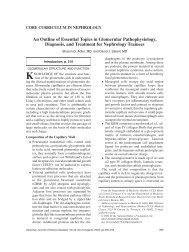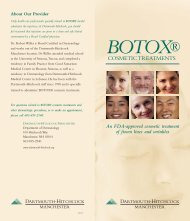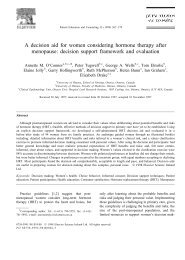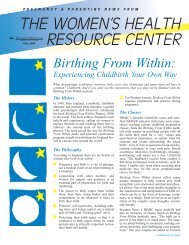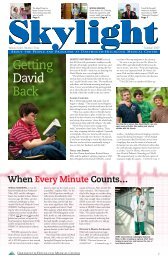Surgery and Healing in the Developing World - Dartmouth-Hitchcock
Surgery and Healing in the Developing World - Dartmouth-Hitchcock
Surgery and Healing in the Developing World - Dartmouth-Hitchcock
You also want an ePaper? Increase the reach of your titles
YUMPU automatically turns print PDFs into web optimized ePapers that Google loves.
40<br />
414 <strong>Surgery</strong> <strong>and</strong> <strong>Heal<strong>in</strong>g</strong> <strong>in</strong> <strong>the</strong> Develop<strong>in</strong>g <strong>World</strong><br />
time can you buy before a real emergency arrives? These questions were compounded<br />
by even greater complications when we were at mobile cl<strong>in</strong>ics see<strong>in</strong>g migrant workers,<br />
s<strong>in</strong>ce <strong>the</strong>se people had no legal status <strong>in</strong> Thail<strong>and</strong>, mak<strong>in</strong>g it almost impossible for<br />
<strong>the</strong>m to be transferred to o<strong>the</strong>r medical facilities. Even <strong>in</strong> my limited experience, I<br />
have seen much waste of life due to delayed management caused by <strong>the</strong> lack of<br />
logistical support for nonmalaria care.<br />
I came back to <strong>the</strong> US after 2 months of an <strong>in</strong>credible amount of learn<strong>in</strong>g,<br />
excitement, frustration, <strong>and</strong> sadness on <strong>the</strong> border. That first trip motivated me to<br />
read <strong>and</strong> research more about malaria <strong>and</strong> o<strong>the</strong>r tropical diseases, <strong>and</strong> to be curious<br />
about how NGOs work with <strong>the</strong> population on <strong>the</strong> border.<br />
Five months later, I was <strong>in</strong>vited by <strong>the</strong> International Rescue Committee (IRC) to<br />
help with medic tra<strong>in</strong><strong>in</strong>g <strong>in</strong> ano<strong>the</strong>r group of refugee camps near Mae Hong Son, a<br />
small border town located on <strong>the</strong> nor<strong>the</strong>rn border of Thail<strong>and</strong> with Burma. The<br />
IRC is a US organization, based <strong>in</strong> New York, that provides considerable support <strong>in</strong><br />
humanitarian crisis situations all over <strong>the</strong> world <strong>in</strong>clud<strong>in</strong>g Burma.<br />
Work<strong>in</strong>g with <strong>the</strong> IRC was a slightly different experience. I worked exclusively<br />
with medics do<strong>in</strong>g bedside teach<strong>in</strong>g <strong>and</strong> tra<strong>in</strong><strong>in</strong>g on basic wound care <strong>and</strong> trauma<br />
management. The common problems we saw were similar: mostly <strong>in</strong>fectious diseases<br />
rang<strong>in</strong>g from HIV to malaria <strong>and</strong> dengue; from typhoid, to diarrheal diseases<br />
to septic abortion, from pneumonia to sk<strong>in</strong> <strong>and</strong> eye <strong>in</strong>fections. We also saw a significant<br />
number of patients with untreated or unrecognized hypertension, heart failure,<br />
<strong>and</strong> renal failure.<br />
When I was with <strong>the</strong> International Rescue Committee, I worked closely with a<br />
Burmese-Canadian doctor named W<strong>in</strong> My<strong>in</strong>t Than. She has been try<strong>in</strong>g to develop<br />
a tra<strong>in</strong><strong>in</strong>g system that adopts <strong>the</strong> health system setup <strong>in</strong> rural Burma where you have<br />
one doctor per township of a large population. This is an umbrella system <strong>in</strong> which<br />
many multipurpose health workers <strong>in</strong>clud<strong>in</strong>g health officers, nurses, midwives,<br />
medics, lady health visitors work <strong>in</strong> <strong>the</strong> community under <strong>the</strong> supervision of <strong>the</strong><br />
doctor <strong>the</strong>y do health education, diagnosis <strong>and</strong> treatment, referral, transport. By<br />
emulat<strong>in</strong>g this system on <strong>the</strong> border, we not only make it easier to reach every little<br />
corner of <strong>the</strong> community <strong>the</strong>re, but we set ourselves up to go back <strong>in</strong>to Burma one<br />
day <strong>and</strong> to fit right <strong>in</strong> to <strong>the</strong> effective preexist<strong>in</strong>g system, but with newer <strong>and</strong> more<br />
up-to-date skills <strong>and</strong> <strong>in</strong>formation.<br />
I have gone back <strong>and</strong> forth between <strong>the</strong> US <strong>and</strong> <strong>the</strong> border area a few times now.<br />
Aside from my experiences with <strong>the</strong> SMRU <strong>and</strong> <strong>the</strong> IRC, I have also worked at a<br />
medical cl<strong>in</strong>ic, Mae Tao, led by Dr. Cynthia Maung, that deals exclusively with<br />
illegal migrant workers from Burma.<br />
Throughout <strong>the</strong> Thai-Burma border area, <strong>the</strong>re are also, <strong>in</strong> my humble op<strong>in</strong>ion,<br />
three huge hidden silent problems. One is chronic malnutrition. I don’t remember<br />
how many patients with B1 deficiency I saw; many are ei<strong>the</strong>r pregnant women or<br />
new mo<strong>the</strong>rs. In America, we see B1, a very basic vitam<strong>in</strong>, deficiency only <strong>in</strong> patients<br />
with chronic alcoholism. A second hidden problem is psychological trauma—<br />
mostly <strong>the</strong> trauma of flee<strong>in</strong>g <strong>and</strong> fight<strong>in</strong>g <strong>and</strong> witness<strong>in</strong>g atrocity <strong>and</strong> bloodshed,<br />
<strong>and</strong> <strong>in</strong> a significant number of cases, <strong>the</strong> trauma of domestic violence. That is strongly<br />
related to my third problem: addiction to alcohol <strong>and</strong> drugs.<br />
These problems are made worse by <strong>the</strong> almost complete absence of basic health<br />
education. I met many people who still believe that malaria comes from eat<strong>in</strong>g bad<br />
bananas. I met many mo<strong>the</strong>rs who strongly believe that <strong>the</strong>y should not give any<br />
fluid or food to kids with bad diarrhea <strong>and</strong> who sadly watch <strong>the</strong>ir kids slowly fade



